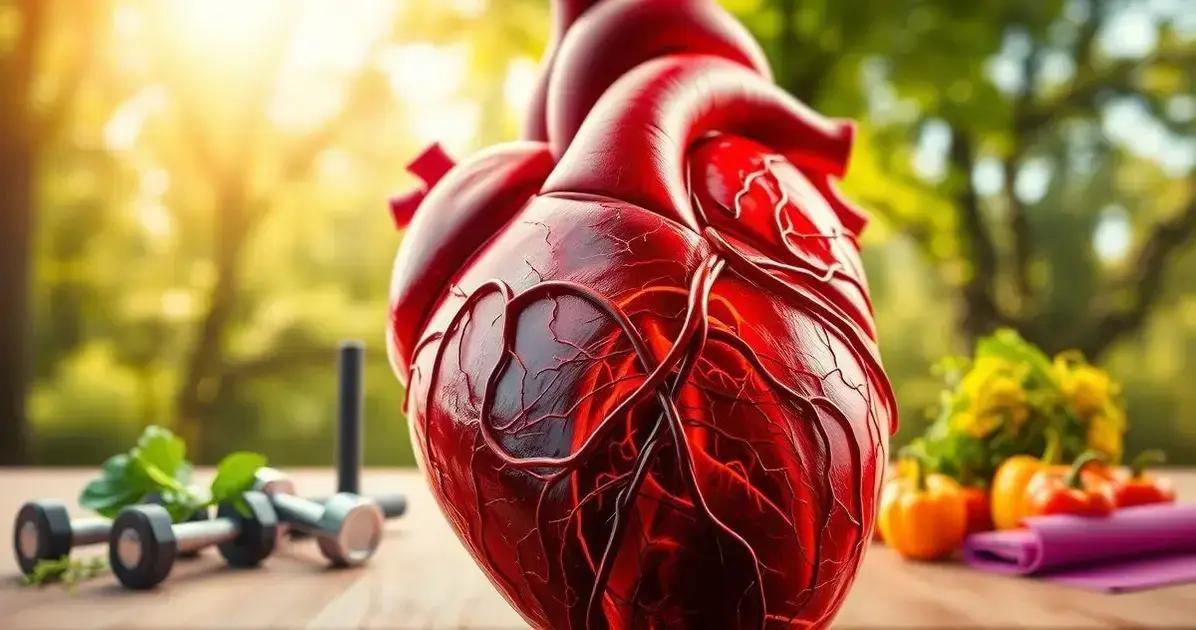To improve circulation and prevent erectile dysfunction, focus on regular physical activity, maintain a healthy diet rich in fruits and vegetables, manage stress effectively, and seek professional medical advice when needed.
Improving circulation is crucial for preventing erectile dysfunction. Many men face this issue, but there are practical steps to enhance blood flow and regain confidence. By focusing on lifestyle changes, incorporating regular exercise, and making wise dietary choices, you can significantly improve your circulation. This article will explore five effective tips to achieve better circulation and prevent erectile dysfunction.
Understanding Circulation and Erectile Dysfunction

Understanding circulation is essential when discussing issues like erectile dysfunction (ED). Circulation refers to the movement of blood throughout the body, transporting oxygen and nutrients to the organs and tissues. Proper blood flow is necessary for overall health, including sexual health.
Erectile dysfunction often occurs when blood flow to the penis is restricted. This can happen due to various factors, such as age, health conditions, and lifestyle choices. Conditions like high blood pressure, diabetes, and high cholesterol can particularly impact circulation.
How Blood Flow Affects Erectile Function
When a man becomes sexually aroused, the brain sends signals that increase blood flow to the penis. This blood fills the erectile tissues, causing an erection. If circulation is inhibited, it can lead to difficulties in achieving or maintaining an erection. Thus, understanding the link between circulation and erectile dysfunction is vital for exploring ways to prevent and address this issue.
Factors That Impact Circulation
Several factors can affect circulation and, indirectly, erectile function. These include:
- Poor Diet: Diets high in unhealthy fats and sugars can contribute to arterial plaque buildup, worsening blood flow.
- Lack of Exercise: Regular physical activity increases blood circulation and helps maintain a healthy weight, both important for preventing ED.
- Stress and Mental Health: Chronic stress can lead to poor circulation and psychological factors affecting sexual performance.
By recognizing the importance of circulation, men can take proactive steps toward improving their health, reducing the risk of erectile dysfunction.
Tip 1: Regular Physical Activity

Regular physical activity is one of the most effective ways to improve circulation and prevent erectile dysfunction. Engaging in exercise can enhance blood flow, increase stamina, and promote overall health. It’s recommended to aim for at least 30 minutes of moderate exercise most days of the week.
Types of Exercises to Consider
Here are some types of activities that can be beneficial:
- Cardiovascular Exercises: Activities like walking, running, cycling, and swimming get the heart pumping and improve blood circulation. These exercises help lower blood pressure and cholesterol levels.
- Strength Training: Lifting weights or doing body-weight exercises can increase muscle mass, which boosts metabolism. Increased muscle mass helps in better blood flow and overall cardiovascular health.
- Flexibility and Stretching: Yoga and stretching improve flexibility and blood flow. They can help reduce stress, which is important for maintaining healthy erectile function.
Benefits of Regular Exercise
Participating in regular physical activity has multiple benefits:
- Improves circulation, essential for erectile function.
- Reduces stress and anxiety, thus enhancing mood and confidence.
- Helps maintain a healthy weight, reducing the risk of conditions that can lead to erectile dysfunction.
Making exercise a fun part of your daily routine can yield significant health benefits. Consider activities that you enjoy to maintain motivation.
Tip 2: Healthy Diet Choices

Making healthy diet choices is crucial for improving circulation and preventing erectile dysfunction. What you eat directly affects your blood flow and overall health. A balanced diet provides the nutrients needed for optimal body function, including sexual health.
Foods to Include
Here are some foods that can enhance circulation:
- Fruits and Vegetables: Fresh fruits and vegetables are packed with vitamins, minerals, and antioxidants. Foods like berries, spinach, and beets can help improve blood flow.
- Healthy Fats: Incorporate sources of healthy fats, such as avocados, nuts, and olive oil. These fats support heart health and can improve blood circulation.
- Lean Proteins: Chicken, fish, and legumes provide essential proteins that support muscle health and energy levels without saturating fat.
Foods to Avoid
Equally important is to limit certain foods:
- Sugary Foods: High sugar diets can lead to weight gain and obesity, which increases the risk of erectile dysfunction.
- Processed Foods: These often contain unhealthy fats and preservatives that can negatively affect circulation.
- Saturated and Trans Fats: Foods high in these fats can lead to clogged arteries and poor blood flow, essential for erections.
By choosing healthier foods, you can enhance circulation and support better sexual health. Making these dietary changes can also contribute to an overall healthier lifestyle.
Tip 3: Managing Stress Effectively

Managing stress effectively is vital for improving circulation and preventing erectile dysfunction. When stress levels are high, the body can produce hormones that tighten blood vessels, which can restrict blood flow. This is why finding ways to reduce stress is important for overall health.
Techniques for Stress Management
Here are some methods that can help manage stress:
- Mindfulness and Meditation: Practicing mindfulness or meditation can reduce anxiety and help you stay focused. Even a few minutes a day can make a difference.
- Deep Breathing Exercises: Simple deep breathing techniques can activate your body’s relaxation response. Try inhaling for a count of four, holding for four, and exhaling for four.
- Regular Exercise: Physical activity not only improves circulation but also releases endorphins, which are natural stress relievers.
Connecting with Others
Dedicating time to connect with friends or family can also help alleviate stress. Talking about your feelings can be a great way to release pent-up emotions. Additionally, shared activities can encourage laughter and relaxation.
Establishing a Routine
Keeping a balanced daily routine can help organize your thoughts and reduce overwhelming feelings. Make sure to include time for hobbies and relaxation in your schedule.
By managing stress effectively, you can improve both your mental and physical health, leading to better circulation and a healthier sexual function.
Tip 4: Seeking Professional Advice

Seeking professional advice is an important step in managing erectile dysfunction and improving circulation. If lifestyle changes are not enough, it may be time to consult a healthcare professional for expert guidance.
Why Professional Help Matters
A doctor can provide personalized advice based on your health history and specific needs. They can help identify any underlying conditions that may be affecting your circulation or erectile function, such as:
- Diabetes: This condition can damage blood vessels and nerves, impacting blood flow.
- Heart Disease: Heart conditions can restrict blood flow, which is crucial for erection.
- Hormonal Imbalances: Low testosterone levels can lead to erectile dysfunction.
What to Expect During Your Visit
When you visit a healthcare provider, they may conduct a physical exam and ask about your symptoms, medical history, and lifestyle habits. They might also request tests to check your blood sugar, cholesterol levels, and hormone levels.
Potential Treatment Options
Based on the findings, your doctor may recommend various treatments or medications to improve circulation and address erectile dysfunction. These can include:
- Medications: Such as PDE5 inhibitors to help increase blood flow.
- Counseling: If stress or psychological factors are involved, therapy may be suggested.
- Other Interventions: Such as penile pumps or injections.
Reaching out for professional advice can pave the way for effective treatment and a better quality of life.
Improving Circulation and Preventing Erectile Dysfunction
Making healthy choices in your lifestyle is essential for enhancing circulation and preventing erectile dysfunction. By incorporating regular physical activity, choosing a nutritious diet, managing stress effectively, and seeking professional advice, you can improve both your physical health and sexual well-being.
Understanding the connections between circulation and erectile function allows you to take proactive steps towards a healthier life. Remember, it’s important to listen to your body and make changes where needed.
With the right approach and care, you can not only boost your overall health but also enjoy a fulfilling and satisfying sex life.
FAQ – Frequently Asked Questions about Improving Circulation and Preventing Erectile Dysfunction
How can regular physical activity improve circulation?
Regular physical activity increases heart rate and blood flow, which helps improve circulation and reduce the risk of erectile dysfunction.
What dietary changes should I make to enhance circulation?
Incorporating fruits, vegetables, healthy fats, and lean proteins while avoiding sugary and processed foods can significantly improve circulation.
Why is stress management important for sexual health?
Managing stress effectively helps prevent hormonal imbalances and maintains healthy blood flow, both of which are crucial for erectile function.
What role does professional advice play in addressing erectile dysfunction?
A healthcare professional can provide personalized assessments, identify underlying health issues, and recommend appropriate treatments for erectile dysfunction.
What are some effective stress management techniques?
Techniques such as mindfulness, deep breathing exercises, regular exercise, and connecting with friends can help manage stress.
How often should I consult my doctor about sexual health issues?
It’s advisable to consult your doctor whenever you experience ongoing issues with erectile dysfunction or other sexual health concerns.













